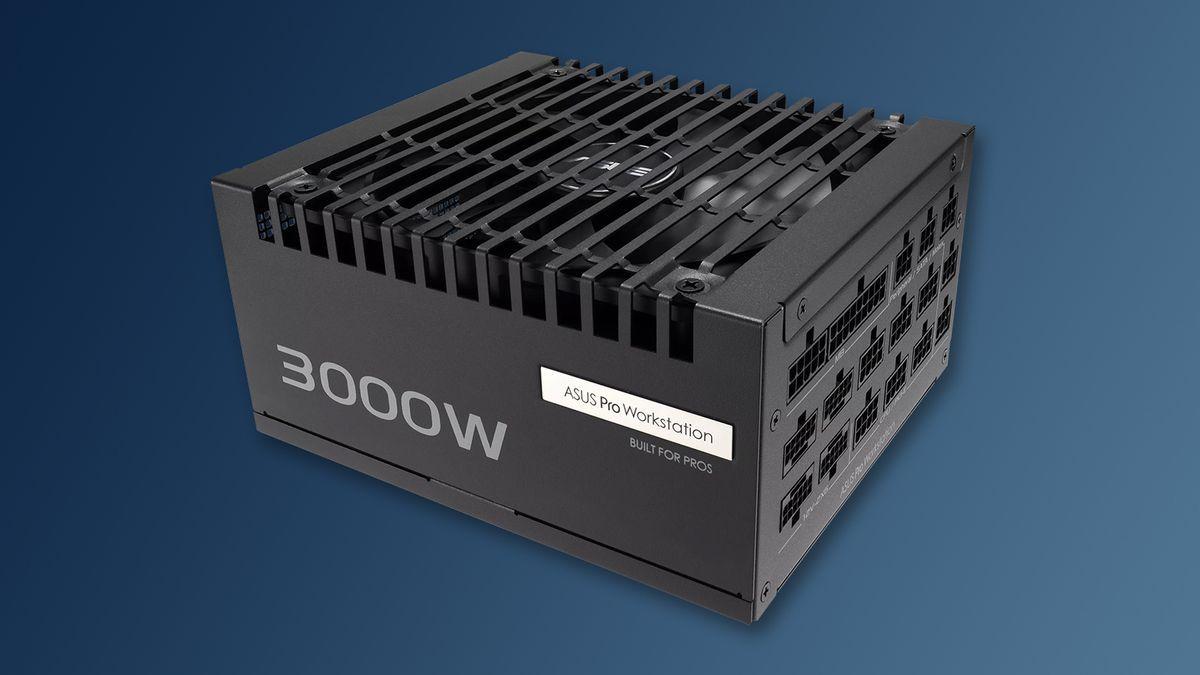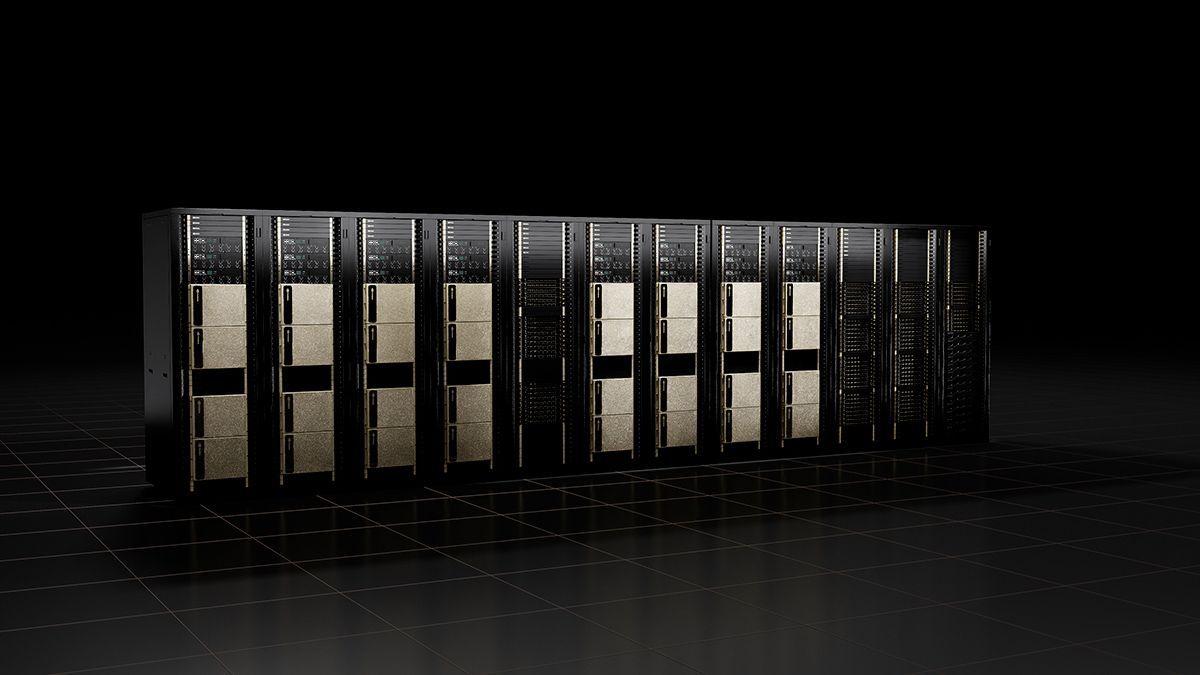New 80 Plus Ruby PSU Certification Sets New Efficiency Standard for Data Centers
5 Sources
5 Sources
[1]
New 80 Plus Ruby PSU efficiency rating exceeds Titanium standard, coming to data centers
In brief: New, higher energy efficiency ratings have gradually emerged for top-tier power supply units (PSUs) over the years, and new workloads have encouraged standards to continue increasing. In response to the growing pressure from cloud computing, artificial intelligence, and other data-intensive applications, ClearResult has introduced its latest benchmark. ClearResult recently introduced 80 Plus Ruby, a new energy efficiency rating for PSUs that surpasses the current highest tier, Titanium. Initially, Ruby-rated PSUs will be used in data centers, though it's unclear when they will be available for consumer PCs These Ruby-rated PSUs could just as well be labeled 90 Plus, as they are required to maintain at least 90% energy efficiency across the entire power delivery system, even under a light 5% load at 230V, 277V, and 480V AC-DC, as well as 380V DC. This requirement, known as light loading, helps minimize energy waste in redundant or oversized data center configurations. Ruby PSUs must also achieve 91% efficiency at 10% load, 95% at 20% load, 96.5% at 50% load, and 92% at 100% load. The 80 Plus certification program is a voluntary rating system that indicates how efficiently a PSU converts electricity from an alternating current (AC) wall outlet to the direct current (DC) needed by a computer. The "80 Plus" label originally signified that certified units must achieve at least 80% efficiency at 20%, 50%, and 100% load levels. Launched in 2004, the 80 Plus system began with Bronze, Silver, and Gold ratings, which became common across PSUs at different price points. At 115V, the Gold rating requires 92% efficiency at 50% load and 87% at full load. Higher-grade PSUs now achieve Platinum and Titanium ratings. Platinum requires 92% efficiency at 50% load and 89% at 100% load (at 115V), while Titanium PSUs raise that bar to 94% and 90%, respectively. Also check out: Anatomy of a Power Supply Unit (PSU) High-efficiency ratings are particularly important for high-wattage systems, especially those exceeding 1,000W. Notable examples include SilverStone's 2,500W PSU, Super Flower's 2,800W unit, and Asus's 3,000W beast - all of which carry Platinum certifications. ClearResult emphasized the importance of advancing energy efficiency standards in anticipation of increasing data center power demands. The company estimates that data centers currently account for 0.4% of total U.S. electricity consumption, a figure that could rise to as much as 12% by 2028. This surge would likely be driven by the rapid growth of generative AI, known for its high energy requirements.
[2]
New 80 Plus Ruby PSU efficiency rating exceeds Titanium standard...
In brief: New, higher energy efficiency ratings have gradually emerged for top-tier power supply units (PSUs) over the years, and new workloads have encouraged standards to continue increasing. In response to the growing pressure from cloud computing, artificial intelligence, and other data-intensive applications, ClearResult has introduced its latest benchmark. ClearResult recently introduced 80 Plus Ruby, a new energy efficiency rating for PSUs that surpasses the current highest tier, Titanium. Initially, Ruby-rated PSUs will be used in data centers, though it's unclear when they will be available for consumer PCs These Ruby-rated PSUs could just as well be labeled 90 Plus, as they are required to maintain at least 90% energy efficiency across the entire power delivery system, even under a light 5% load at 230V, 277V, and 480V AC-DC, as well as 380V DC. This requirement, known as light loading, helps minimize energy waste in redundant or oversized data center configurations. Ruby PSUs must also achieve 91% efficiency at 10% load, 95% at 20% load, 96.5% at 50% load, and 92% at 100% load. The 80 Plus certification program is a voluntary rating system that indicates how efficiently a PSU converts electricity from an alternating current (AC) wall outlet to the direct current (DC) needed by a computer. The "80 Plus" label originally signified that certified units must achieve at least 80% efficiency at 20%, 50%, and 100% load levels. Launched in 2004, the 80 Plus system began with Bronze, Silver, and Gold ratings, which became common across PSUs at different price points. At 115V, the Gold rating requires 92% efficiency at 50% load and 87% at full load. Higher-grade PSUs now achieve Platinum and Titanium ratings. Platinum requires 92% efficiency at 50% load and 89% at 100% load (at 115V), while Titanium PSUs raise that bar to 94% and 90%, respectively. Also check out: Anatomy of a Power Supply Unit (PSU) High-efficiency ratings are particularly important for high-wattage systems, especially those exceeding 1,000W. Notable examples include SilverStone's 2,500W PSU, Super Flower's 2,800W unit, and Asus's 3,000W beast - all of which carry Platinum certifications. ClearResult emphasized the importance of advancing energy efficiency standards in anticipation of increasing data center power demands. The company estimates that data centers currently account for 0.4% of total U.S. electricity consumption, a figure that could rise to as much as 12% by 2028. This surge would likely be driven by the rapid growth of generative AI, known for its high energy requirements. Permalink to story:
[3]
80 Plus Ruby: The aim for 96.5% Efficiency for Data Centers Power Supplies
The debut of the Ruby tier in the 80 Plus certification lineup marks a technical evolution for power supplies aimed at data centers and server farms. To earn a Ruby badge, a unit must hit at least 96.5 percent conversion efficiency at half load when fed 277 V or 480 V. It also needs to maintain 92 percent efficiency at full load. These criteria bump the bar above the previous Titanium level, offering a clearer benchmark for reducing energy waste across the most common operating ranges. Server energy usage has surged as cloud platforms and AI tasks place growing demands on data-center infrastructure. Analysts forecast that U.S. data-center electricity consumption could climb by between 6.7 and 12 percent by 2028. Recognizing that much of this power use happens even when servers are lightly loaded, the Ruby standard introduces a 5 percent-load requirement: units must still convert at least 90 percent of incoming voltage into usable output at this low threshold. This ensures that energy savings extend to idle or background operations -- critical for maintaining efficient power-usage effectiveness (PUE). Industry reactions have been swift. Delta Electronics has already secured Ruby approval for its 5 500 W redundant server supply, and other manufacturers are lining up to release compliant models. For IT gurus tasked with balancing performance, cost and sustainability, the Ruby certification provides a practical specification to guide procurement. By focusing on efficiency at multiple load levels, data centers can lower electricity bills, decrease cooling loads, and make progress toward carbon-reduction targets -- all by choosing the right power-supply hardware. To understand the Bronze, Silver, Gold, Platinum, Titanium, and Ruby PSU ratings please check the following 80 PLUS Certification rating chart: 80 PLUS Certification115V Internal Non-Redundant115V Industrial% of Rated Load10%20%50%100%10%25%50%100%80 PLUS-80%80%80% PFC ≥ 0.90-80 PLUS Bronze-82%85% PFC ≥ 0.9082%-80 PLUS Silver-85%88% PFC ≥ 0.9085%80%85% PFC ≥ 0.9088%85%80 PLUS Gold-87%90% PFC ≥ 0.9087%82%87% PFC ≥ 0.9090%87%80 PLUS Platinum-90%92% PFC ≥ 0.9589%85%90% PFC ≥ 0.9592%90%80 PLUS Titanium90%92% PFC ≥ 0.9594%90%- 80 PLUS Certification230V EU Internal Non-Redundant230V Internal Redundant% of Rated Load10%20%50%100%5%10%20%50%100%80 PLUS-82%85% PFC ≥ 0.9082%--80 PLUS Bronze-85%88% PFC ≥ 0.9085%--81%85% PFC ≥ 0.9081%80 PLUS Silver-87%90% PFC ≥ 0.9087%--85%89% PFC ≥ 0.9085%80 PLUS Gold-90%92% PFC ≥ 0.9089%--88%92% PFC ≥ 0.9088%80 PLUS Platinum-92%94% PFC ≥ 0.9590%--90%94% PFC ≥ 0.9591%80 PLUS Titanium90%94% PFC ≥ 0.9596%91%-90%94% PFC ≥ 0.9596%91%80 PLUS Ruby----90% PFC ≥ 0.9091% PFC ≥ 0.9095% PFC ≥ 0.9696.5% PFC ≥ 0.9692% PFC ≥ 0.96 80 PLUS Certification277V / 480V Internal Redundant380V DC Internal Redundant% of Rated Load5%10%20%50%100%5%10%20%50%100%80 PLUS 80 PLUS Bronze 80%82%85% PFC ≥ 0.9082% 80%82%85%82%80 PLUS Silver 82%85%89% PFC ≥ 0.9085% 82%85%89%85%80 PLUS Gold 85%88%92% PFC ≥ 0.9088% 85%88%92%88%80 PLUS Platinum 88%90%94% PFC ≥ 0.9591% 88%90%94%91%80 PLUS Titanium 90%94% PFC ≥ 0.9596%91% 90%94%96%91%80 PLUS Ruby90% PFC ≥ 0.9091% PFC ≥ 0.9095% PFC ≥ 0.9696.5% PFC ≥ 0.9692% PFC ≥ 0.9690%91%95%96.5%92%
[4]
80 PLUS 'Ruby' certification announced for the data center, with a higher-end 96.5% efficiency
As an Amazon Associate, we earn from qualifying purchases. TweakTown may also earn commissions from other affiliate partners at no extra cost to you. CLEAResult is North America's largest energy efficiency, energy transition and energy sustainability services provider, announcing its new 80 PLUS "Ruby" certification, the highest level of energy efficiency certification ever established for data center server PSUs worldwide. We have all been hearing and reading about the supersonic rise in data center storage and AI-powered applications, which has been driving a greater energy efficiency in data center operations. CLEAResult says that data centers make up approximately 0.4% of the total US electricity consumption, with this figure expected to "rise dramatically" to somewhere between 6.7% and 12% by 2028 as storage, data processing, and AI workloads expand. Divakar Jandhyala, CLEAResult's Chief Product & Technology Officer said: "Achieving the highest standard of operations for data centers is critical as energy demand quickly grows and we are proud that the 80 PLUS Ruby certification is setting the example of what optimal data center energy efficiency can look like worldwide". Jason Boehlke, Senior Energy Sustainability Practice Manager at CLEAResult, added: "It represents a next-level benchmark, providing the industry with a standard for both performance and energy usage". Atthapon Sermkarndee, Senior Qualification Engineering Manager with Delta Electronics Thailand added: "We achieved three certifications and see the value in 80 PLUS Ruby certifications. It adds a level of trust in efficacy that the whole industry can rely on". What is 80 PLUS certification program? 80 PLUS® is a performance specification and certification program for internal power supply units (PSUs). One can easily access 80 PLUS® certified products and testing reports through our online portal. Its performance specification requires power supplies in computers and servers to be 80% energy efficient or greater at 10%, 20%, 50% and 100% of rated load with a true power factor of 0.9 or higher. 80 PLUS® offer seven levels of certification for internal power supplies at increasing ratings of energy efficiency ranging from Standard to Ruby: There are currently seven categories of certified power supplies:
[5]
80 PLUS "Ruby" Certification Announced For Data Center: Efficiency Can Now Reach An Incredible 96.5%
As the requirement for high-efficiency PSUs booms, we now have the 80 PLUS Ruby standard, which aims to offer the highest efficiency among all the 80 Plus ratings. Power supplies come in various power efficiency ratings, which are often indicated through the 80 Plus certification. From 80 Plus to 80 Plus Titanium, the PSU manufacturers offer options to consumers and enterprises to enhance their systems' power efficiency. Up until now, the 80 Plus Titanium offered the highest possible efficiency on various loads, but this is now being topped by another rating called 80 Plus "Ruby". Achieving the highest standard of operations for data centers is critical as energy demand quickly grows and we are proud that the 80 PLUS Ruby certification is setting the example of what optimal data center energy efficiency can look like worldwide, - Divakar Jandhyala, CLEAResults Chief Product and Technology Officer CLEAResult, which is an energy transition and energy sustainability services provider in NA, announced this certification in March, which aims to offer up to a staggering 96.5% power efficiency on typical loads. On paper, it may not look too impressive coming from the Titanium certification, but that 0.5% higher efficiency can make a big difference when it comes to the data centers. The 80 Plus Titanium could offer up to 96% efficiency on 50% load, which is the best you could afford till now. The 80 Plus Ruby not only surpasses the Titanium certification at 50% load but also at 10%, 20%, and 100% with 91%, 95%, and a good 92% power efficiency. Interestingly, the 80 Plus Ruby-certified PSUs can achieve a staggering 90% efficiency even at 5% load. This will ensure incredible power savings at ultra-low loads and will be particularly helpful in scenarios where the servers don't need a lot of resources to execute smaller processes. It represents a next-level benchmark, providing the industry with a standard for both performance and energy usage. - Jason Boehlke, Senior Energy Sustainability Practice Manager, CLEAResult One of the first power supplies to bring this standard to Data Centers is from Delta Electronics, which is a Chinese PSU company. Delta released its 5,500W PSU for AI servers that can achieve a staggering 97.5% efficiency. Expect more such PSUs to be introduced soon, but it's unlikely that the 80 Plus Ruby certification will make it to the mainstream PSUs for the consumer market.
Share
Share
Copy Link
ClearResult introduces the 80 Plus Ruby certification for power supply units, surpassing the Titanium standard with up to 96.5% efficiency. This new benchmark aims to address the growing energy demands of data centers, particularly in light of AI and cloud computing advancements.
Introduction to 80 Plus Ruby Certification
ClearResult, North America's largest energy efficiency and sustainability services provider, has introduced a new benchmark for power supply unit (PSU) efficiency: the 80 Plus Ruby certification
1
.
Source: Guru3D
2
.Ruby Certification Requirements
The 80 Plus Ruby certification sets a new bar for PSU efficiency:
- Minimum 90% efficiency across the entire power delivery system
- 91% efficiency at 10% load
- 95% efficiency at 20% load
- 96.5% efficiency at 50% load
- 92% efficiency at 100% load
These requirements apply to 230V, 277V, and 480V AC-DC, as well as 380V DC configurations
3
.Importance of Light Loading Efficiency
A key feature of the Ruby certification is its focus on light loading efficiency. PSUs must maintain at least 90% efficiency even under a light 5% load, which helps minimize energy waste in redundant or oversized data center configurations
1
.Evolution of 80 Plus Certification
The 80 Plus certification program, launched in 2004, has evolved over time:
- Bronze, Silver, and Gold ratings (initial tiers)
- Platinum and Titanium ratings (higher efficiency tiers)
- Ruby (newest and highest efficiency tier)
Each tier represents an increase in efficiency requirements, with Ruby now setting the highest standard
4
.
Source: TechSpot
Impact on Data Center Energy Consumption
The introduction of the Ruby certification comes at a critical time for data center energy management:
- Current data center electricity consumption: 0.4% of total U.S. electricity use
- Projected increase: 6.7% to 12% by 2028
- Driving factors: Rapid growth of generative AI and increased cloud computing demands
1
Related Stories
Industry Response and Adoption
The industry has responded positively to the new certification:
- Delta Electronics has already secured Ruby approval for its 5,500W redundant server supply
- Other manufacturers are preparing to release compliant models
2

Source: Wccftech
Benefits of Ruby Certification
Adopting Ruby-certified PSUs can lead to several benefits for data centers:
- Lower electricity bills
- Decreased cooling loads
- Progress toward carbon-reduction targets
- Improved overall power-usage effectiveness (PUE)
2
Future Implications
While the Ruby certification is currently aimed at data centers, it sets a new benchmark for PSU efficiency that could eventually influence consumer-grade power supplies. However, it's unlikely that 80 Plus Ruby certification will make it to mainstream PSUs for the consumer market in the near future
4
.References
Summarized by
Navi
[1]
[4]
Related Stories
Power Supply Arms Race: Manufacturers Unveil 3000W+ PSUs for AI Workstations
21 May 2025•Technology

NVIDIA Unveils 800V High-Voltage DC Power System for Next-Gen AI Data Centers
28 May 2025•Technology

Navitas Unveils World's First 8.5kW AI Data Center Power Supply Using GaN and SiC Technology
06 Nov 2024•Technology

Recent Highlights
1
ByteDance's Seedance 2.0 AI video generator triggers copyright infringement battle with Hollywood
Policy and Regulation

2
Demis Hassabis predicts AGI in 5-8 years, sees new golden era transforming medicine and science
Technology

3
Nvidia and Meta forge massive chip deal as computing power demands reshape AI infrastructure
Technology





